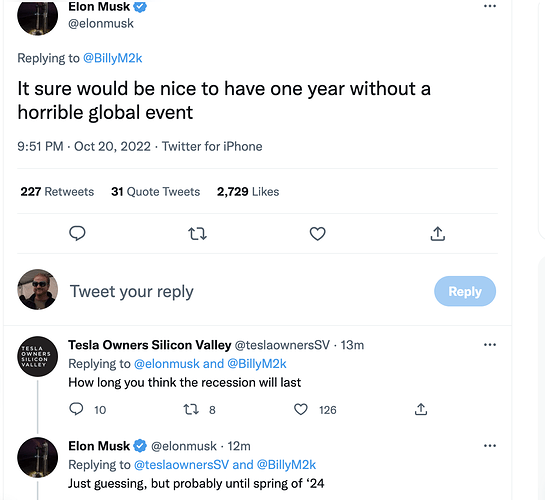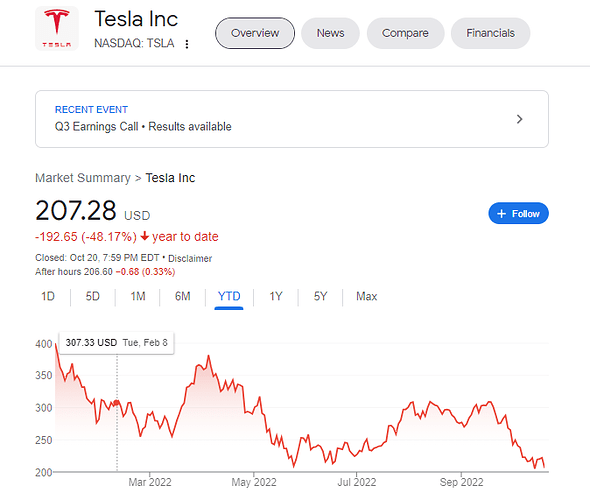You can consider the question a question of what to do with your next new dollar to invest, so that you don’t taint the decision with past loses on your existing portfolio which are kind of irrelevant.
Can confirm that all the 100-yen sushi chains recently jacked prices to 120 yen.
When inflation starts rising in Japan, you know we’re all screwed.
…what kind of sushi does 100 yen buy? チキンシー?

Lower but most of the pain driving it lower comes sooner. So most years higher than that but we head 30-70 percent lower first.
Good news is we might be past peak inflation because people are out of money and it costs a ton to borrow money, bad news is we might be heading into a global depression because people are out of money and it costs a ton to borrow money.
An explosion of trading volume in options with one, or even zero, days left until they expire is helping to drive the large intraday swings in major U.S. equity indexes that are becoming increasingly common as of late
Large trading shops have been buying — or, as McElligott puts it “YOLO-ing” — these near-expiry options as part of a broader trading strategy that allows them to profit by anticipating the hedging activity of large options dealers.
Retail traders once dominated trading in this corner of the options market, but that has changed in recent weeks as institutional traders have picked up the slack as retail traders have retreated, McElligott said.
Instead of recklessly gambling like Robinhood-using amateurs, these professional volatility traders are buying these options as part of a calculated strategy to force large dealers to move markets in their favor, as McElligott explains.
The strategy has allowed these traders to generate profits in a volatile trading environment while minimizing their risk. Traders often close out the trades “mere hours” after opening them.
In that respect, these professionals are behaving like”full-tilt day traders, using the certainty of Dealer hedging flows that their orders create to then amplify and ‘juice’ the intended directional market move,” McElligott said.
Yeah, soon enough bad news will be bad news for stocks again.
a) Apparently we’re in a recession, but with record low unemployment and record corporate profits.
b) Love the assumption that things can never get worse and we’ll be back to record low unemployment, record corporate profits, zero inflation, and soaring stock prices (because anything less is a recession) in a matter of months.
Did you think he typed Spring of '23? If we are in a recession, 15-18 months is a pretty decent guess for how long it could last imo.
Well whatever 18 months is still a matter of months if you want to push it.
But seriously - if your definition of “not being in a recession” is “2021 levels of every financial metric”, you might be in for some disappointment.
I don’t know what to call this - inflationary period with slightly depressed stock prices? But I wouldn’t call it a recession.
A recession is when people can’t find a job. The whole reason we have inflation and record corporate profits is because people keep paying the increased prices – because they have the money to do so. This seems super obvious to me. Is it not?
It seems more like everyone is hoping for a real recession, so that inflation slows down, causing the fed to lower interest rates, so that stonks can stonk again. Which is a weird place to be. Americans just cannot be happy, ever.
The billionaire recession. Someone needs to coin that ASAP.
I’m not arguing the recession bit. In any case it’s not measured by profits and unemployment, although those typically go down as we enter a recession for sure. But considering the average recession lasts about 12 months, it just seemed weird to categorize his prediction of a recession lasting slightly longer than average as off the wall because it’s too short.
My argument would be a) we’re not in a recession, and b) when we do get in one, then we’ll start worrying about how long it’s going to last.
I guess if you say “How long will this inflationary period with record low unemployment and record corporate profits and slightly depressed stonk prices last?” then sure - maybe 12-24 months.
But the end of that period could be an actual recession where people get laid off and can’t find work, and actual normal people are hurting, not just stock holders. And no one’s going to be happy about that either.
It feels like we’re setting up “2021” as the standard for being happy about the state of the economy. That’s crazy. Look at the early 70s to '96 or so - one long recession punctuated by a few short-lived booms. Everyone expects endless boom time now or they’re ready to riot.
For the record I know some families are getting squeezed by prices on essentials and obviously hurting. But at least jobs are still growing on trees. No job is a much deeper level of hurting.
Considering that GDP was down two consecutive quarters, and there are other signs of the economy potentially hitting a rough patch, I don’t think it’s crazy to argue that we are in or entering a recession. It doesn’t feel like it to me either, but there are actual economists arguing that we are.
My buddy told me his industrial lighting company raised prices three times in the last year, and their costs didn’t go up at all. All the price hikes were because customers expect inflation now and don’t push back. That sure seems like a weird recession to me.
Ok, so your point is that GDP didn’t actually go down and somebody made a mistake with the numbers? You know all sectors don’t all have to go down in a recession? And it could be a mild one versus a really steep drop in GDP.
I’m not even arguing that we are in one for sure. Just that he’s not way out on a limb by himself here for thinking that we are in one.
My point is that I’ve been through a bunch of recessions in my 53 years, and this feels completely unlike any of them. All the other ones had high unemployment and low corporate profits. Not the opposite.
I guess economists have some different definition of recession than the one I’ve always assumed, based on living through them.

